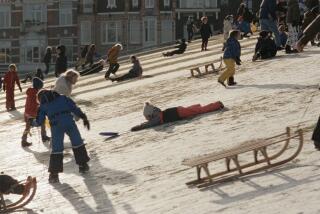Personal history
- Share via
To appreciate the achievement of Saul Friedlander’s newest book, “The Years of Extermination: Nazi Germany and the Jews, 1939-1945,” which won the Pulitzer Prize last week, consider what befell the author during those years.
In 1942, Friedlander’s parents left their son in a French monastery before leaving for Switzerland. Friedlander was raised there as a Catholic. His parents were stopped by the Swiss, passed back to the French, and in turn, handed over to the Germans. They died in Auschwitz.
Now consider what has happened since: Friedlander discovered his parents were dead, reclaimed his Jewish heritage, fought with the Israeli army, was the first to hold a chair in Holocaust studies at UCLA, won a MacArthur genius grant and, among many other achievements, served on a fact-finding commission on Switzerland’s role in the Holocaust, recruited by the very country whose wartime leaders had doomed his parents.
Along the way, critics and fellow scholars say, he has maintained in his several Holocaust histories a brilliant and balanced voice, becoming one of the world’s leading authorities on what may be the most analyzed and least analyzable subject of the last century.
Friedlander’s two-volume work (the first examined the 1930s) combined the recollections of survivors -- whose memories he compared to “lightning flashes that illuminate” the landscape -- with official documents detailing the actions of powerful Nazi leaders. He contradicted the histories that sought to contextualize the Holocaust into relative normalcy, as well as those that sought to divorce the mass extermination of European Jews from the ideology of anti-Semitism. In fact, he argued that a “redemptive anti-Semitism” informed German policy of the time -- the belief that ridding the world of Jews would redeem it.
As he wrote bluntly in the second volume: “Not one social group, not one religious community, not one scholarly institution or professional association in Germany and throughout Europe declared its solidarity with the Jews. ... To the contrary, many social constituencies, many power groups, were directly involved in the expropriation of the Jews and were eager ... for their wholesale disappearance.”
His latest book -- praised for its lack of academic jargon, sentimentality or too-passionate denunciations -- set a standard for historians, especially those writing what they have also lived, struggling with the demands of history and memory and knowing that, for some events, neither can quite capture what happened.
More to Read
Sign up for our Book Club newsletter
Get the latest news, events and more from the Los Angeles Times Book Club, and help us get L.A. reading and talking.
You may occasionally receive promotional content from the Los Angeles Times.










